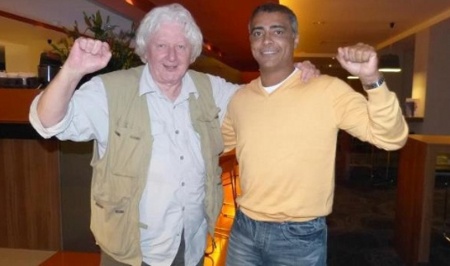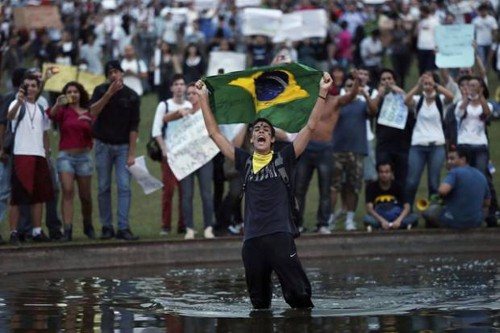On Sunday night, a tremendous left footed strike from 21-year-old Brazil football prodigy, Neymar Junior, shifted the balance of power at the Maracanã Stadium in Rio de Janeiro as hosts, Brazil, produced a stunning 3-0 win over Spain in the 2013 FIFA Confederations Cup final.
But, yesterday, protest groups in Brazil clamoured for a different sort of national strike as they continue to pressure their Government on a series of issues about socio-political life in South America’s largest nation.
FIFA president Sepp Blatter must have been relieved to leave the land of football’s most successful international team. Throughout his stay, the Swiss football administrator was booed and jeered on sight and, uncharacteristically, he left Brazil during the group stages and only returned for Sunday’s final.

(Courtesy Daily Telegrah.co.uk)
Blatter and Brazil president Dino Rousseff will hope that national anger subsides over the next 12 months before the real stuff starts and Brazil kicks off the 2014 World Cup. But, as Wired868 learnt on its “DIRECTV Road to Brazil 2014” media tour, these are turbulent times and nothing should be taken for granted.
Even Neymar’s eye-raising talent, which has Brazilians dreaming of a record sixth World Cup title and a first on home soil, is unlikely to be enough to paper over the cracks.
At first glance, Brazil looks to be a paradise. It is officially winter but, in Rio de Janeiro, the temperature rarely dipped below 20 degrees Celsius and male joggers ran bare chested while women bicycled past in bra tops.
The Brazilian economy is booming, its cosmopolitan people are friendly and charming and, of course, its football is on the rise again.
But, even as throngs of enthused, colourful fans descended on the Maracanã venue, the favelas or shanty towns were clearly visible in the background on the Rio hills. Many live in poverty here without even access to clean water.

Many in the favelas (in the background) have bigger problems.
For them, the World Cup is just another example of irresponsible spending by the Brazilian Government.
But to summarise the conflicts as merely reactionary anger to cost overruns is to miss the point entirely. This goes much deeper and, according to anonymous sources, FIFA is very concerned indeed as to whether Rousseff can restore some semblance of order in time for the showcase tournament next year.
Gustavo Mehl, a researcher with the Rio de Janeiro federal university, is an organiser of one protest group called the “Popular Committee for the World Cup and the Olympics” which comprises of a mixture of professors, teachers and students as well as Rio residents.
Once a week, leaders from his Comite Popular Rio group meet with a network of protest groups that can number as much as 50. The numbers within each group varies but, for the Confederations Cup, over 1 million people took to the streets and Rousseff was forced to give three public addresses during the two week competition.
Mehl explained the primary reason behind their objection to the World Cup and Olympics.

“We understand the World Cup and Olympic Games in its roots is a very positive thing,” Mehl told Wired868. “We are very much in favour of sport events and we believe that these mega-events in sports and other things can be an argument for positive transformation for the city.
“But we understand that the World Cup and the Olympics happen not with the sense of being a sport event in the first place. They are made like business events for big profits for big corporations and enterprises…
“The Government and sport fans do not own and cannot interfere with these events. They are owned by these big corporations and economic interests that articulate with Governments to make changes in the cities that doesn’t respond to the aspirations of people.”
Mehl’s group started in 2007 to protest the Pan American Games and has grown steadily since. The flashing point occurred last month when several Rio youth movements took to the streets to peacefully protest the hike in transport prices.
The police response, according to Mehl, was brutal.
Trinidad and Tobago flirted, earlier this year, with introducing a military police. In Brazil, Mehl complained of the potential savagery of such a body, which a throwback from Brazil’s era of military dictatorship.
“The police here in Brazil is a militarised corporation that has violence as an important aspect in its activation,” he said. “The police of Rio kill thousands of people every year, which is the highest number of police slayings in the world.
“It is a tradition in brazil that popular manifestations, rebellions and social agitations are firmly and violently repressed. We demand that the police has institutionally in its mind the protection the people and not the protection of the State and the power.”
The young protesters, many of whom were students, returned home badly beaten to stunned parents who then turned on the news and heard about their children being described as criminals. Youths also shared their own account of the clashes with the police. And that is when Brazil really got angry. The result was the largest demonstration that Brazil has seen in twenty years.

(Courtesy globeandmail)
“The media in Brazil reflects the conservative perspective and powerful economic interest,” said Mehl. “The issue of democratisation of communication here is also a big issue… The big media is controlled by big corporations and families that have access to circles of power in Brazil for generations.
“They tried to take away the importance of the movement.”
As Brazilians spontaneously took to the streets, the demands became increasingly varied. Many citizens have been forcibly evicted from their homes so FIFA can have its new stadia and parking lots for the tournament.
Investment in health and education dropped, which led one group to argue that Neymar is not more important than a teacher.
The issues of Government corruption, the violation of the rights of its citizens and the “forced social transformation in the name of the World Cup and the Olympics” have also touched a chord.
Most of all, according to Mehl, the Brazilian populace wants a greater say in the way the country is run. Like in Trinidad and Tobago, civil society in Brazil seems more keenly aware than ever of the inadequacies of a democratic system that gives citizens little formal influence outside of the ballot box.

“In all the cities there is an issue of dissatisfaction with the political system and economic model in Brazil,” said Mehl. “People are demanding that the civil society and population must have more of an effect in public deliberations and decisions. The population and organised groups have no say within the Government; there is no institutional space for influence by civil society.”
On the field, Neymar’s ability to influence and master his surroundings has brought joy to millions. But now Brazilians want more control over their destiny too.
Potentially, the destination of the next World Cup, the Brazilian Government’s credibility and FIFA’s pride are at stake.

Lasana Liburd is the managing director and chief editor at Wired868.com and a journalist with over 20 years experience at several Trinidad and Tobago and international publications including Play the Game, World Soccer, UK Guardian and the Trinidad Express.
 Wired868 Wired868 for smart sport news and opinion
Wired868 Wired868 for smart sport news and opinion







One comment
Pingback: Can Brazil deliver the World Cup stadia, much less the crown? | Wired868